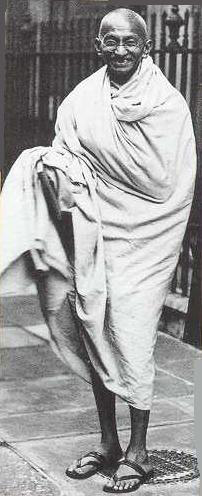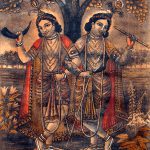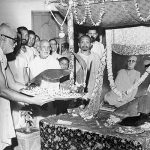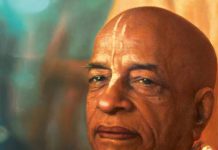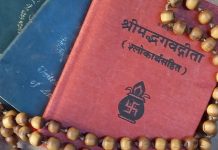Mahatma Gandhi (1869-1948) was among India's most fervent nationalists, fighting for Indian independence from British rule. Gandhi rose to the eminence of being called “amoral genius” by no less a person than the celebrated British philosopher C. E. M Joad.
He was disillusioned by the hypocrisy of the Western civilization.
He denounced England's devilish acts in India, and proclaimed it as a "Satanic Power'. Then, gave the cry for the 'Quit India' movement.
While in London, Gandhi wrote: "Looking at this land, I at any rate have grown disillusioned with Western civilization. They spend, their days in luxury or in making a bare living and retire at night thoroughly exhausted. In this state of affairs, I cannot understand when they can devote themselves to prayers."
It is said that Gandhi was once asked what he thought of Western civilization, and answered that he felt it might be a good idea.
{quotes}He passionately rejected the British project of Westernizing India.
As is clear from the Mahatma's polemic against the Christian missionaries, he was first and foremost a Hindu, who opposed all designs to destroy Hindu culture.
He claimed: "I am a proud staunch Sanatani Hindu." He took considerable pride in this self-identification. Far from being a dirty word as it would soon become even for some so-called Hindu leaders, the word "Hindu" conveyed to him all that was noble and elevating. He did not feel that he was being "communal" when he called himself a Hindu. For him Hinduism was a a vast, spiritual vision beckoning man to rise to the highest heights.
He has further stated:
"Hinduism has made marvelous discoveries in things of religion, of the spirit, of the soul. We have no eye for these great and fine discoveries. We are dazzled by the material progress that Western science has made. Ancient India has survived because Hinduism was not developed along material but spiritual lines."
"Hinduism is a relentless pursuit of Truth. "Truth is God" and if today it has become moribund, inactive, irresponsive to growth, it is because we are fatigued; and as soon as the fatigue is over, Hinduism will burst upon the world with a brilliance perhaps unknown before.”
"The tendency of Indian civilization is to elevate the moral being, that of the western civilization is to propagate immorality. The latter is godless, the former is based on a belief in God."
"I believe that the civilization India has evolved is not to be beaten in the world. Nothing can equal the seeds sown by our ancestry. Rome went; Greece shared the same fate; the might of the Pharaohs was broken; Japan has become westernized; of China nothing can be said; but India is still, somehow or other, sound at the foundation."
About the Bhagawad-Gita, Gandhi, says: “Today the Gita is not only my Bible or my Koran, it is more than that—it is my mother… When I am in difficulty or distress I seek refuge in her bosom.”
Gandhi, the author of the Quit India movement was inspired by the teachings of Krishna in the Gita.
"Hinduism is a living organism liable to growth and decay subject to the laws of Nature. One and indivisible at the root, it has grown into a vast tree with innumerable branches. The changes in the season affect it. It has its autumn and its summer, its winter and its spring. It is, and is not, based on scriptures. It does not derive its authority from one book. "Non violence has found the highest expression and application in Hinduism.
"I think I have understood Hinduism correctly when I say that it is eternal, all-embracing and flexible enough to suit all situations. "
Hinduism contains the essence of all religions. What it does not contain is not worth knowing.
Since Hinduism is based on truth and nonviolence , it can never oppose any other religion. Hinduism strives for the betterment of all religions, and through them of the entire world.
"I am a Hindu because it is Hinduism which makes the world worth living."
{quotes}I am a Hindu hence I Love not only human beings, but all living beings.
He observed on Hinduism's environmentally sensitive philosophy by saying:
"I bow my head in reverence to our ancestors for their sense of the beautiful in nature and for their foresight in investing beautiful manifestations of Nature with a religious significance."
He considered the Bhagavad Gita as a book ' par excellence' for the knowledge of Truth (God).
Gandhi called the Gita the 'Gospel of Selfless Action'.
"India is to me the dearest country in the world, because I have discovered goodness in it. It has been subject to foreign rule, it is true. But the status of a slave is preferable to that of a slave holder."
“Hinduism is a living organism. One and indivisible at the root, it has grown into a vast tree with innumerable branches. Knowledge is limitless and so also the application of truth. Everyday we add to our knowledge of the power of Atman (soul) and we shall keep on doing so.”
He was a Hindu to the core. Defining his attitude to a prominent Indian Christian, Kali Charan Banerjee (1847-1902) he said:
"I am unable to identify with orthodox Christianity. I must tell you in all humility that Hinduism, as I know it, entirely satisfies my soul, fills my whole being, and I find solace in the Bhagavad Gita and the Upanishads that I miss even in the Sermon on the Mount….I must confess to you that when doubts haunt me, when disappointments stare me in the face, and when I see not one ray of light on the horizon I turn to the Bhagavad Gita, and find a verse to comfort me; and I immediately begin to smile in the midst of overwhelming sorrow. My life has been full of external tragedies and if they have not left any visible and indelible effect on me, I owe it to the teachings of the Bhagavad Gita.
Gandhi wrote in his book Autobiography or the Story of My Experiments with Truth:
As "philosophically there was nothing extraordinary in Christian principles" no one, much less a Hindu, would ever give it a second look.
Mahatma Gandhi told Romain Rolland in Switzerland on his way back to India from the Round Table Conference (1911) that Christianity is an echo of the Indian religion and Islam is the re-echo of that echo."
" I have no other wish in this world but to find light and joy and peace through Hinduism."
"If all The Upanishads and all the other scriptures happened all of a sudden to be reduced to ashes, and if only the first verse in the Ishopanishad were left in the memory of the Hindus, Hinduism would live for ever."
Gandhi has written: "The Gita "struck me as one of priceless worth."
He upholds the "spirit behind idol-worship" and is prepared "to defend with my life the thousands of holy temples which sanctify this land."
{quotes}For him cow protection is the dearest possession of the Hindu heart and no one who does not believe in cow-protection can possibly be a Hindu.
The sacred thread has "deep meaning for him" as it is "the sign of the second birth, that is spiritual." He says that varnashrama is "inherent in human nature, and Hinduism has simply made a science of it."
"What the divine author of the Mahabharata said of his great creation is equally true of Hinduism. Whatever of substance is contained in any other religion is always to be found in Hinduism, and what is not contained in it is insubstantial or unnecessary."
"Hinduism insists on the brotherhood of not only all mankind but of all that lives."
"Hinduism is like the Ganga, pure and unsullied at its source but taking in its course the impurities in the way. Even like the Ganga it is beneficent in its total effect. It takes a provincial form in every province, but the inner substance is retained everywhere."
"On examination, I have found it to be the most tolerant of all religions known to me. Its freedom from dogma makes a forcible appeal to me inasmuch as it gives the votary the largest scope for self-expression." He saw no reason to for changing his belief or his religion. He found it impossible "to believe that I could go to heaven or attain salvation only by becoming a Christian." "Philosophically there was nothing extraordinary in Christian principles. From the point of view of sacrifice, it seemed that the Hindus greatly surpassed Christians. It was impossible for me to regard Christianity as a perfect religion or the greatest of all religions."
London Times editorial said on the day after his death: "No country but India and no religion but Hinduism could have given birth to a Gandhi."
"Hindu Dharma is like a boundless ocean teeming with priceless gems. The deeper you dive the more treasures you find."
"Hinduism is like Ganga, pure and unsullied at its source, but taking in its course the impurities in the way".
"Cow-protection is an article of faith in Hinduism. Apart from its religious sanctity, it is an ennobling creed. Cow protection is the dearest possession of the Hindu heart. It is the one concrete belief common to all Hindus. No on who does not believe in cow-protection can possibly be called a Hindu. It is a noble belief. I endorse every word of what Prof. Vaswani has said in praise of the cow. For me the cow is the personification of innocence. Cow protection means that protection of the weak and helpless."
"I bow my head in reverence to our ancestors for their sense of the beautiful in nature and for their foresight in investing beautiful manifestations of Nature with a religious significance."
Thoreau and Gandhi both believed in non-violence, had religious temperament, were vegetarians, and admired the teachings of the Bhagavad Gita. The appreciated poverty and lived the simple life. Webb Miller in his book I found no peace p. 240, wrote: “Gandhi received back from America what was fundamentally the philosophy of India after it had been distilled and crystallized in the mind of Thoreau.” The nationalist movement of Congress, and its political vision of a free India, was as thoroughly suffused with the spirit of Hinduism. Nationalism and religion were thus allied in Gandhi's teachings. Gandhi found the substance of India's life in Hinduism. His political vocabulary of Ram rajya, ahimsa, satyagraha, swaraj, bharat mata, swadeshi etc.


